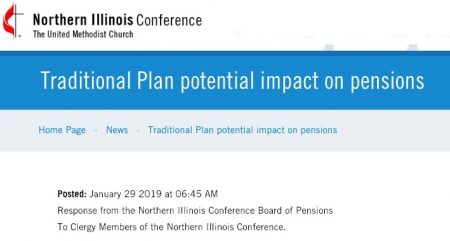
Two Weeks of Churn
Two weeks ago, Hacking Christianity published the article “Wespath study reveals Traditionalist Plan cruelly targets Clergy Pensions” which examined the Traditionalist Plan’s uneven effect on our pensions. It was meant as a resource for General Conference delegates to see if they wanted to afflict clergy unequally, and for annual conferences to consider if they
Within an hour of the blog post, Traditionalist Plan supporters wrote that the analysis was not true. Calls were made to my annual conference staff, and to Wespath (the UMC pension and benefits agency) board members. Wespath tweeted “feeling misinformed?” graphics. A bishop’s staffer requested a delegate in the West lobby me to take the post down. Bishops and pension managers sent mass emails to their annual conferences telling people to only get their info from official sources—not blogs.
The flurry of activity and high-level pressure had a common theme: surely the Traditionalist Plan wasn’t that broken. Surely it couldn’t be that unfair to clergy lifetimes of service! And surely the analysis by the blog post was false, right? Right??
But now the truth of those claims has been independently verified.

Pensions Board Study
The Northern Illinois Conference Board of Pensions, either independently or spurred on by the January blog post, decided to investigate further into the Traditionalist Plan legislation. As an annual conference board, they are obligated to look after the concerns of their conference clergy, who would bear the financial impact of these decisions.
Their report is written with plain language on a complex topic.
[A]s currently written, the traditional plan will freeze the accrual of benefits for the clergy of a separating annual conference; The UMC will not fund the inflation adjustments that dramatically change what clergypersons expect to receive in pension for the years already worked…
It is incorrect to claim that any outcome of General Conference 2019 “avoids disruption to clergy pensions.” Shifting pension liabilities between separate legal entities is disruptive. It is impossible to predict the capacity or the willingness of a separated annual conference to restore the accrual of benefits frozen by The UMC…
While everyone may have the best intentions, recasting the conference relationship to the denomination as the traditional plan provides will change the capacity of the conference to provide benefits. Under the traditional plan, when an annual conference leaves or is forced out, The UMC will freeze benefit accruals. No one should be guaranteeing that clergy will not experience any change when much of that outcome lies with decisions of a future conference with less capacity than the present one.
It’s important to note this is not an uneducated yahoo conference board: one member was a former Wespath rep to the General Conference that created the current clergy pension program. So their careful research is informed and super-helpful for other annual conferences considering how to connect with their clergy concerns.

Wespath Updates FAQ
The blog post two weeks ago apparently caused a lot of headaches for Wespath and conference pension officers. Some of it was due to the supporters of the Traditionalist Plan freaking out. And some of it was due to misreading the blog post’s claims. I apologize for any disruptions of people’s days as a result of the post.
Wespath responded with an expanded Frequently Asked Questions on A Way Forward which dealt directly with some of the questions raised by Hacking Christianity—in fact, they went from about 18 questions answered to over 40 questions answered inside of a few days.
Overall, Wespath does a good job answering questions brought up by the blog post and peripheral questions that the blog post didn’t ask. It’s great for annual conferences and clergy and laity to have a well-rounded resource created in just a few short days. Check it out!

Are the claims true?
So we now have these two resources. How do they handle the claims made in the original blog post about the way how the Traditionalist Plan unfairly handles clergy pensions?
Claim #1: Clergy in exited conferences are treated differently than continuing clergy
Relevant Wespath FAQ entry: What if the Traditional Plan prevails and an entire annual conference does leave The United Methodist Church? What would happen to clergy benefits and annual conference liabilities?
- Wespath confirms that the exited annual conference would be sequestered (“frozen”) and capped (“cease increasing”). Also confirmed is that medical coverage, life insurance, death payouts, etc would cease unless the exited conference continued them.
Relevant Pension Board quote:
This proposed conversion is available to clergy who withdraw from the annual conference. It is likely unavailable to clergy whose annual conference separates from the denomination as legislation is currently written. Petition #90017 and Discipline paragraph 360 refer to a clergyperson withdrawing “…from their annual conference.” While the traditional plan asserts, “clergy members of the departing annual conference shall by default remain
members of that annual conference unless they request to remain in The United Methodist Church.”
…as currently written, the traditional plan will freeze the accrual of benefits for the clergy of a separating annual conference; The UMC will not fund the inflation adjustments that dramatically change what clergypersons expect to receive in pension for the years already worked.
Summary: Everyone keeps their pension earned. Continuing clergy in the UMC will receive benefit improvements based on years of service. Clergy in the exited conference would not get this benefit improvement, and will not get the “fix” offered by Wespath in petition #90017 that other clergy would receive.
Claim #2: There could be a $300,000 gap between continuing and exited clergy
Relevant Wespath FAQ entry: Is it true that if the Traditional Plan is approved, my pension will automatically be
- This is accurate: no one loses their pension earned. What claim #1 above articulates is that the benefit improvements would be unequal between an exited annual conference and a continuing one.
To calculate the original $300,000 claim, we used a document from Wespath that was made for annual conferences who exited clergy before the Traditionalist Plan would take effect (ie. now). The document articulated that the gap between a clergyperson who turns in their credentials and a clergyperson who continued in United Methodism would be almost $300,000 in missed benefits and benefit improvements. While it is true now (and Wespath used it themselves for a 2019 delegation briefing), it wasn’t actually made for the post-GC possible scenarios, and there are some differences.
First, the document included HRA contributions as a benefit. But HRA contributions come from the Annual Conference and not the pensions and benefits office, so that’s $60k that shouldn’t be part of the equation. Thanks to Wespath executives for correcting this in an email exchange.
Second, to calculate benefit reductions, I asked for a one-to-one comparison tool and Wespath said there were too many variables to be able to offer one, so we don’t know the actual discrepancy. There is no way to know what an exited conference (now a new denomination) would do with the death benefits and other benefit improvements, as they would not be obligated to do anything The UMC is currently offering.
Indeed, their capacity to offer similar benefits as an entire denomination would be reduced. Relevant Pension Board quote:
Not all the money in the separated conference’s CRSP account will transition with that annual conference. The assets will be reduced by the costs of promises to clergy who decide to remain in The UMC and contingent annuitants by something like 170% of what a conference contributed (market rate vs. funding rate). Subtracting those amounts leaves fewer resources than originally contributed for the clergy who migrate with the separating annual conference.
Summary: We regret we were partially incorrect about the $300,000 number, as the only quantifiable gap is the $150,000 lack of benefit improvements in the example by Northern Illinois. But given the reductions in the ability/obligations of the exited conference, we continue to be confident that the gap would be higher than that estimate regarding the final real value of the pensions earned from 2007-2019, solely because of a conference being exited by the Traditionalist Plan.
Mind the Gap
We now have clarity from the annual conference perspective and from the general agency perspective. And even though Wespath advised the anonymous Traditionalist Plan authors on this section with the best possible outcome that the best-paid professionals in United Methodism can think of, there’s still an incredible gap between clergy exited by the Traditionalist Plan and those who continue. The proposed structure of pensions and benefit improvements is the best solution to the problem of the Traditionalist Plan, and it falls far short.
Wespath, working within the constraints of the legislation (which was written outside of Commission on A Way Forward discernment–probably a source of a lot of its problems!), was unable to find a legal pathway to equal treatment, though they got closer than any mere mortals could.
The only conclusion left is that the Traditionalist Plan is fundamentally flawed.
A Better Way Forward
As a clergy member of an annual conference vulnerable to being exited by the Traditionalist Plan, it is my obligation to my colleagues to provide accurate information. It is also my obligation to my family, given my 30 years of future ministry means my compensation gap between continuing in the UMC and being exited by the Traditionalist Plan is wider than most people. I’ve served every year of CRSP too, so my personal situation is perhaps the most extreme example of someone potentially harmed by the Traditionalist Plan.
I’m heartened that the blog has awakened many to the incredible unavoidable pitfalls of the Traditionalist Plan’s provision to exit annual conferences. And if you delete that provision entirely…then it just continues the UMC on the path we have been and will do nothing to change the status quo.
The response of Traditionalist Plan supporters is “we can fix it later” but that is becoming a tired refrain: the Traditionalist Plan will require both substantial legal amendments to satisfy the Judicial Council, and risky floor pension amendments that could become far afield of what Wespath would want to be able to care for clergy retirement and benefits. At some point, reasonable Traditionalist Plan supporters will need to concede it is too broken to fix, especially when more legal and fair solutions are on the table.
My hope is that General Conference delegates are more creative and seek the novelty of One Church Plan, Simple Plan, or the Connectional Conferences Plan as more viable, creative, and faithful ways forward.
Your turn
Thoughts?
Thanks for reading, commenting, and sharing on social media. And for sharing this article with those who originally disputed it.



I came here to hear the crickets in the comment section and was not disappointed.
Nice work. It was important to confirm this.
Jeremy, you got it right in pointing out that in divvying up the spoils of a very painful divorce, somebody always loses. Under the Traditionalist Plan, exiting annual conferences would have to ‘pay off’ Wespath to protect the full pension rights of the minority of traditionalist clergy who would leave for other annual conferences where they would find ideological comfort (or at least their guaranteed pensions) in a rump UMC.
The exiting annual conferences would thus have significantly fewer financial resources from which to ‘restore’ the pension benefits that would otherwise be lost to clergy who would no longer benefit from being part of the unified fiscal system of the (former) United Methodist Church.
Not only that! Because of the preferential treatment enjoyed by transferring traditionalist clergy, exiting annual conferences would be ‘robbed’ of a percentage of the vested pension funds that would otherwise provide a guaranteed ‘floor’ for your pension.
You don’t have to be an actuarial genius to see that any United Methodist clergy person in the existing system would be crazy to try to sink the Titanic In hopes that their little piece of it would float off and land intact on the shores of Nirvana Island in the South Pacific, allowing them to forget about all their fellow clergy who capsized and drowned in a sea of retirement debt when Wespath defaulted on their pension obligations.
Even the almighty Wespath can only work with what’s in the bank, or with payments duly deposited by a smoothly and fully functioning fiscal system that’s not at war with itself over ‘irreconcilable differences’ of opinion about some people’s sexual behavior.
The guys (yes, most of them are males) threatening to sink the Titanic are those with protected financial resources, such as large, wealthy, and conservative multi-site congregations that are itching to leave United Methodism with a ‘gracious exit’ in place and a good excuse to cut and run–such as the One Church Plan. Without having to pay apportionments, they will have plenty in their slush funds to pay generous pensions to their formerly UM clergy.
Or, if they succeed in capturing the denominational flag of United Methodism, they can run Wespath the way they like, cut off the resources of those ‘liberal’ general boards and agencies they despise, and crack down on the Council of Bishops. And make sure the resulting system runs the way they want it to.
After those guys commandeer the ship, they won’t have to walk the pension plank they’re forcing the exiles to walk. It’s a neat form of fiscal persecution. Especially when those guys deny that they’re doing it. Intentionally.
It was Ben Franklin, no less, who warned his fellow insurrectionists that “We must…all hang together or, most assuredly, we shall all hang separately.” It is the genius of our connectionalism to seek the welfare of the whole body, rather than preferential treatment for those who can pass a purity test at the expense of the rest of us.
You da’ alpha bitch in this yard, Jeremy.
Jeremy, your continued trafficking in disinformation based on your intense hatred of theological conservatives in the UMC is a horrible witness.
I read the Northern Illinois Conference Board of Pensions blog post you linked. Of course changing jobs affects your pension from the job you left; the blog explains why this is the case, an alternative “gracious exit” petition, along with a discussion of the limits of what Wespath can do without taking on unacceptable risk.
You can beat up the Traditional Plan all you want, but it doesn’t change the fact that it’s the ONLY plan that chose to provide an exit path allowing departure with property and assets for those who can’t in good conscience abide by the decisions of GC! Where is your equivalent concern for the much worse financial impact on the many theological conservatives who will depart if the One Church Plan or Simple Plan were to pass? Or, in your eyes, are they so “evil” that they deserve whatever they have coming to them?
To save the reader having to do the comparison himself, here is a key paragraph that Jeremy chose to deceptively truncate:
“It is clear that the Traditional Plan has a fully developed method for handling clergy pensions upon separation of an annual conference that is different than that of petition #90017, absent a clergypersons’ decision to withdraw while that conference is still a part of The UMC. But as currently written, the Traditional Plan will freeze the accrual of benefits for the clergy of a separating annual conference; The UMC will not fund the inflation adjustments that dramatically change what clergypersons expect to receive in pension for the years already worked. It has to be this way. The UMC can not promise benefit accruals to clergypersons of the separated annual conference unless that new entity chooses to fund them. A separate church is a separate church and will make their own decisions. The UMC must provide security to the pensions in the plan and can not take on the risk of additional benefit accruals. A general conference action can not obligate any action from a separate entity.”
Jeremy also conveniently omitted this information that is copied verbatim from the Wespath article that is submitted as a reference source:
Is it true that if the Traditional Plan is approved, my pension will automatically be cut?
No. Neither your pension, nor any retirement account balances, will be reduced by enactment of any of the three Commission plans as they are written.